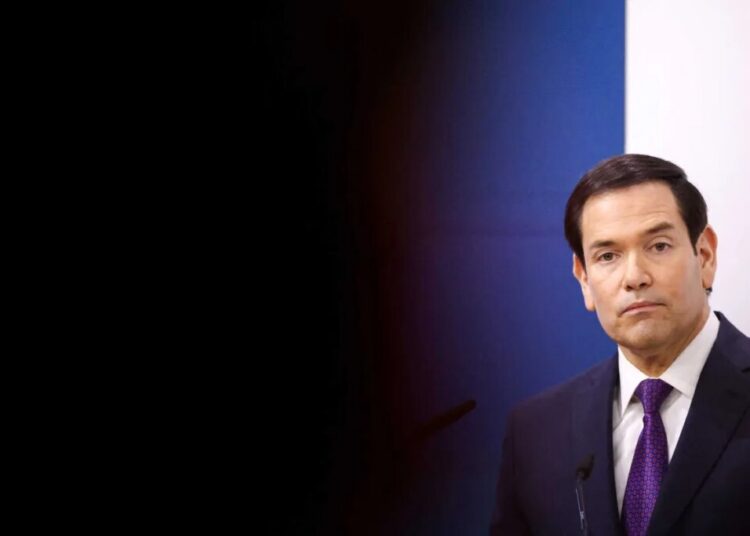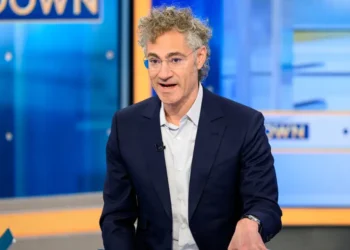This is an edition of The Atlantic Daily, a newsletter that guides you through the biggest stories of the day, helps you discover new ideas, and recommends the best in culture. Sign up for it here.
Gambling is a numbers game, so here are a few: The pitcher Emmanuel Clase’s 2025 salary from Major League Baseball’s Cleveland Guardians is $4.5 million dollars. This weekend, prosecutors unveiled charges that he had made just $12,000 from two recent rigged pitches. And he could face as many as 65 years in prison (though such a stiff sentence seems unlikely).
Clase and the fellow Guardians hurler Luis Ortiz were indicted last week for their involvement in the scheme, which allegedly netted bettors hundreds of thousands of dollars. (Attorneys for Clase and Ortiz have denied the allegations.) The scheme outlined in the indictment is the latest instance of legalized gambling’s corrosive influence on professional sports. Major leagues have welcomed the industry with open arms and greedy palms, signing contracts with betting companies and bringing casinos into stadiums and arenas, but they act astonished when gambling starts to corrupt their own players.
Traditional sports fandom involves rooting for your team to win; traditional sports gambling involves putting money on the game results too. The most notorious baseball-gambling episode was the 1919 “Black Sox” scandal, in which members of the Chicago White Sox (including “Shoeless Joe” Jackson) were accused of intentionally losing the World Series as part of a mob betting scheme and banned from the sport.
The indictment against Clase and Ortiz alleges something that is both less directly threatening to the game’s integrity and somehow even bleaker. Nothing in the charges suggests that Clase, a fearsome closer and three-time All-Star, intentionally lost any games. Instead, prosecutors say, he and Ortiz agreed to throw balls on particular pitches. The gamblers then placed prop bets—wagers on specific outcomes—and won money. In other words, this was gambling for gambling’s sake, staking money on things that no one would care about for any independent reason, and then concocting elaborate methods of cheating to make those things happen.
For decades after the Black Sox scandal, MLB rigorously pushed gambling away. Pete Rose, the sport’s all-time-hits leader, was permanently banned when he was revealed to have placed bets on baseball, though he claimed this didn’t taint the game, because he bet only on his teams to win. (Rose’s ban was repealed earlier this year, after his death, following pressure from President Donald Trump, a longtime casino owner.)
Since a 2018 Supreme Court ruling effectively legalized it, betting has been available widely and has shed much of its stigma. Individual problem gamblers are suffering, and Clase and Ortiz seem likely to pay for their involvement if found guilty. Yet the big corporations of the sports world are doubling down on gambling. Last week, ESPN announced that it was ending ESPN Bet, a gambling foray with Penn Entertainment that failed to capture many users. But the network isn’t abandoning its hopes: It’s signing a new deal with DraftKings, one of the two biggest industry players.
The big sports leagues are way out ahead. Hard figures on how much revenue their involvement with betting has brought them aren’t available, but it’s safe to say the numbers are large. A 2018 projection from an industry group suggested MLB would make $1.1 billion and the NFL would make $2.3 billion annually. And if those estimates aren’t exactly impartial, anyone who’s watched a game, looked at the ESPN app, or driven past innumerable billboards for DraftKings and FanDuel can surmise that a lot of cash is washing around—whether from direct agreements or indirect effects such as ad spending and more attention.
The answer from the leagues has been to try to cut back on prop bets. Keith O’Brien argued in The Atlantic last month—after another depressing gambling scandal, this time in the NBA—that “prop bets pose a particular threat to the integrity of the game.” Any individual athlete has only so much control over whether his or her team wins or loses. But prop bets focus on smaller outcomes over which one player can have a great deal of influence, such as their point total (in basketball) and yardage (in football). As a result, players are particularly susceptible to manipulation, and that in turn corrupts their sport as a whole. After the Clase and Ortiz indictment, MLB said that its partners would limit bets on specific pitches, and NBA Commissioner Adam Silver earlier asked platforms to “pull back some of the prop bets.”
That seems better than nothing, but barely. As Charles Fain Lehman wrote in The Atlantic last fall, the problem is not particular kinds of sports gambling—it’s sports gambling more broadly. “The rise of sports gambling has caused a wave of financial and familial misery, one that falls disproportionately on the most economically precarious households,” he argued, citing research that has found that less saving, more bank overdrafts, and greater rates of bankruptcy are associated with looser gambling laws. These problems are particularly common among young men, who are becoming dangerously addicted, as my colleague Hana Kiros has reported.
Young men also, of course, make up the rosters of MLB, the NFL, and the NBA. No one should be naive about how money suffuses professional sports—the leagues exist to turn a profit—but it’s easy to see why putting intensely competitive men in situations where gambling is celebrated and advertised is going to create temptations they can’t all resist, even if the payoff likely amounts to a rounding error on their paychecks, as in the Clase and Ortiz indictment.
Prohibition has a bad reputation, and American society seems to be turning against regulating vices. I tend to agree that banning everything that is socially undesirable just creates opportunities for overweening enforcement, but gambling still brings out my most puritanical impulses. (You can make a good policy case against banning betting and other vices while still disapproving of them; a principled libertarianism need not be libertine.) Before the 2018 Supreme Court ruling, though, betting wasn’t completely banned. In addition to friendly leagues among friends, gambling was legal in a few select places: Las Vegas, Atlantic City, certain Native American lands. That provided enough of an outlet for people to be able to indulge in gambling from time to time yet ensured that it was viewed as an irregular indulgence, faintly improper.
The past month has seen the best of baseball, in the epochal World Series between the Los Angeles Dodgers and the Toronto Blue Jays, and some of the worst, in this indictment. MLB should think hard about the lessons of the latter. Sports leagues think that they’re in on the deal, but they’re really the mark, falling for the same trap that every gambler does. They see money on the table and can’t resist trying for it, forgetting that the house always comes out ahead.
Related:
- Legalizing sports gambling was a huge mistake. (From 2024)
- “I’m treating guys who would never be caught dead in a casino”
Here are three new stories from The Atlantic:
- The president’s most annoying buddy
- Michael Powell: The moral cost of the Democrats’ shutdown strategy
- Adam Serwer: Why Elon Musk needs Dungeons & Dragons to be racist
Today’s News
- The Senate approved a bipartisan funding bill last night to end the government shutdown, sending it to the House for a vote, expected tomorrow afternoon. The measure would keep the government open through January of next year and fund key agencies for most of 2026. The proposal leaves out the extension of Affordable Care Act subsidies that Democrats had pushed for.
- A Utah judge rejected a Republican-drawn congressional map on Monday, siding instead with a centrist coalition’s proposal, in a redistricting victory for Democrats.
- Flight disruptions continue as airlines are expected to cut about 6 percent of today’s flights nationwide. More than 1,200 U.S. flights were canceled and 2,000 delayed amid a mix of Federal Aviation Agency staffing shortages and severe weather; the agency warned that cancellations could rise to 10 percent by Friday.
Evening Read
What a Cranky New Book About Progress Gets Right
By Tyler Austin Harper
During the five years I worked as an environmental-studies professor at a progressive private college, I undertook a small, semesterly rebellion: I had students read “Confessions of a Recovering Environmentalist,” a 2011 essay by the British writer and former green radical Paul Kingsnorth. In it, Kingsnorth chronicles his disenchantment with the activism that had once been his life’s work—the very kind of advocacy that had driven many of my students, that had driven me, into that classroom in the first place.
The essay makes the case that mainstream environmentalism has abandoned the commitments and ideas that originally defined it.
More From The Atlantic
- Why Trump’s Ukraine peace efforts keep failing
- The right-wing attack on Wikipedia
- China’s EV market is imploding.
- The new brutality of OpenAI
- Pope Leo’s quiet provocation
- The Trump administration has a new plan for Gaza.
Culture Break

Listen. Rosalía’s new album mirrors the modern quest for salvation, in all its thrilling and frustrating contours, Spencer Kornhaber writes.
Read. Megha Majumdar’s novel A Guardian and a Thief imagines how climate disaster might scramble our sense of morality, Tope Folarin writes.
PS
Back in April, I wrote about what I called the “pardon-to-prison pipeline”: the string of people who reoffend after receiving clemency from Trump. Yesterday I saw two relevant updates: First, John Banuelos, who allegedly fired a gun into the air during the January 6, 2021, insurrection, was arrested last month in Utah on charges of sexual assault and kidnapping. And in New York, Jonathan Braun, whom I mentioned in April, was sentenced to more than two years in federal prison after his conviction on charges including assault and sexual abuse. “He is at least the eighth convict to whom Mr. Trump granted clemency during his first term who has since been charged with a crime,” The New York Times noted. Also on Monday, the White House announced that Trump had pardoned 77 people accused of involvement in his attempt to overturn the 2020 election. I’m not a betting man, as you may have guessed, but if I were, I wouldn’t stake much on that group staying out of trouble with the law.
— David
Explore all of our newsletters here.
Rafaela Jinich contributed to this newsletter.
When you buy a book using a link in this newsletter, we receive a commission. Thank you for supporting The Atlantic.
The post Sports Leagues Are Falling Into the Gambling Trap appeared first on The Atlantic.




